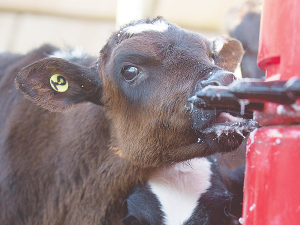DairyNZ Calls for Changes to Government’s Proposed Resource Management Act Reform
DairyNZ says the Government’s proposed Resource Management Act reform needs further work to ensure it delivers on its intent.
 Ensure that all calves are always cared for, including in the paddock and on their way to the calf sheds.
Ensure that all calves are always cared for, including in the paddock and on their way to the calf sheds.
Successful calf rearing starts as soon as the calf is born.
DairyNZ wants farmers to ensure that all calves are always cared for, including in the paddock and on their way to the calf sheds.
It also wants farmers to focus on safety and look after themselves.
“When moving cows and calves, stay safe and don’t turn your back on a newly calved cow.
“Even cows that are usually placid can become aggressive after calving. Keep the calf between you and the cow and don’t take any dogs or children into the calving paddock.
“When lifting calves, bend your knees and keep your back straight. Get assistance if needed.”
It’s important to record all births. Record the following: date, cow (dam) tag number, sex of the calf, alive or dead, calf identity/number, assisted or unassisted calving.
Check the system used on farm for matching cows and calves. If in doubt, checking the breeding information can help; is the cow due? When was the mating date? Does the breed match the bull/sire?
Temporary identification tags can be used for newborn calves in the paddock, like elastic neckbands with tags. Once back in the shed, proper tags can be put on in an environment that is clean and dry. If tagging in the paddock, ensure that the calf’s ear is clean, dry, and disinfected.
Look out for at-risk calves. Calves that had a difficult birth or that are born in poor weather are more likely to have trouble standing and suckling. Identify high risk calves as soon as possible, record their numbers, and bring them to the calf shed to get warm and have a good feed of colostrum.
To prevent navel infection, spray navels of newborn calves in the paddock and on arrival at the shed. Completely spray or dip the navel with iodine. Don’t use teat spray as the glycerine in teat spray can keep navels soft and moist.
Bringing calves from the paddock to the shed: good practice is to pick up newborn calves from the paddock twice daily to bring them to a warm, clean environment and ensure they get enough gold colostrum in the first hours of life.
The trailer used for picking up calves should be cleaned and disinfected regularly. To make transport safer for calves, AstroTurf or another easily cleaned, non-slip material can be used in the bottom of the trailer. Don’t overload the trailer – there should be enough room so that all calves can lie down comfortably. Make two trips if there is not enough room. Calves move around easily so travel at walking pace.
Fit for Travel
Eight things calves need in order to be fit for transport:
Budou are being picked now in Bridge Pā, the most intense and exciting time of the year for the Greencollar team – and the harvest of the finest eating grapes is weeks earlier than expected.
The Real Estate Institute of New Zealand (REINZ) has released its latest rural property report, providing a detailed view of New Zealand’s rural real estate market for the 12 months ending December 2025.
Rural retailer Farmlands has released it's latest round of half-year results, labeling it as evidence that its five-year strategy is delivering on financial performance and better value for members.
OPINION: "We are back to where we were a year ago," according to a leading banking analyst in the UK, referring to US president Donald Trump's latest imposition of a global 10% tariff on all exports into the US.
DairyNZ says the Government’s proposed Resource Management Act reform needs further work to ensure it delivers on its intent.
Overseas Trade Minister Todd McClay says he's working constructively with the Labour Party in the hope they will endorse the free trade agreement (FTA) with India when the agreement comes before Parliament for ratification.
OPINION: Expect the Indian free trade deal to feature strongly in the election campaign.
OPINION: One of the world's largest ice cream makers, Nestlé, is going cold on the viability of making the dessert.